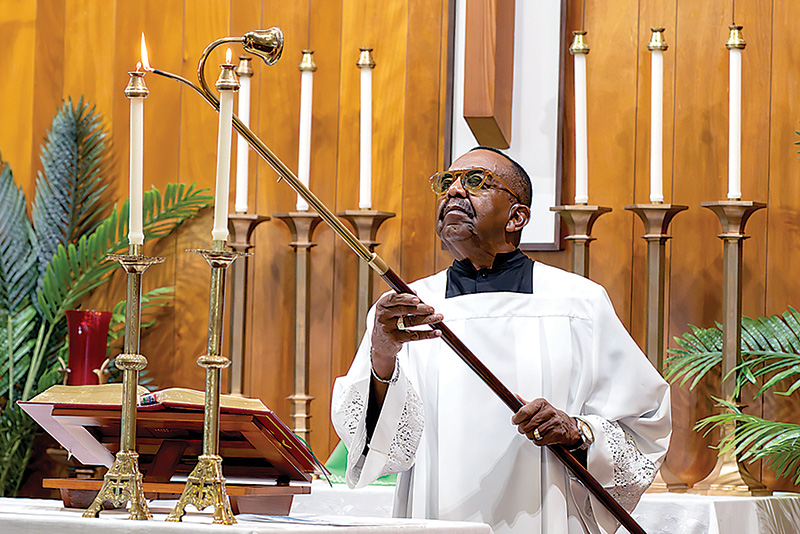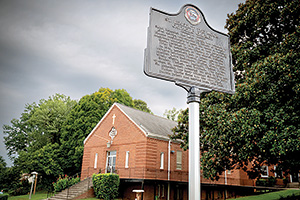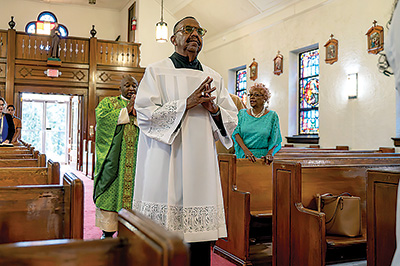'King Willie'
 Willie King, 84, known as “King Willie” to friends, has been an altar server and coordinator of altar servers at St. Benedict the Moor Church in Winston-Salem for 69 years. In 1943, he was the first baby baptized in the parish. WINSTON-SALEM — Nearly every Sunday morning for the past 69 years, Willie King has taken part in the same ritual of faith and service at his home parish of St. Benedict the Moor.
Willie King, 84, known as “King Willie” to friends, has been an altar server and coordinator of altar servers at St. Benedict the Moor Church in Winston-Salem for 69 years. In 1943, he was the first baby baptized in the parish. WINSTON-SALEM — Nearly every Sunday morning for the past 69 years, Willie King has taken part in the same ritual of faith and service at his home parish of St. Benedict the Moor.
He arrives before 9 a.m. at the church, an inviting red brick building perched at the crest of a rolling green lawn on East 12th Street.
He goes inside, laughing and chatting with others preparing for Mass. His demeanor changes as he dons a black cassock and white alb, then with a quiet reverence lights the candles on the altar. As Mass begins, King walks down the red-carpeted aisle, a path walked weekly since childhood, ready to perform the rubrics that are second nature to him.
Now 84, Willie King has been an altar server and coordinator of altar servers at St. Benedict the Moor for nearly 70 years, a milestone few people reach in any kind of ministry, or job for that matter. What makes it even more remarkable is that those years of service unfolded in a parish where his grandparents were among the founding families.
St. Benedict the Moor was established in 1940 to serve the Black Catholic population in Winston-Salem at a time when Jim Crow-era segregation was in effect, including at churches. Black Catholics were relegated to sitting in separate sections or at the back of churches.
“My grandparents would walk over 10 miles to St. Leo the Great, the only other church in the city at the time, every Sunday for Mass, but when they got there they could only sit in the last two rows,” King recalls.
Black Catholics in Winston-Salem appealed to the Diocese of Raleigh, which encompassed all of North Carolina at the time, and in 1940 Bishop Eugene McGuinness created St. Benedict the Moor Parish to serve the population. Before construction of the church was completed, the congregation met for Mass in private homes and at nearby Howard Robinson Funeral Home.
 When St. Benedict the Moor opened in 1941, named for an African-Italian saint, King’s grandparents had only four miles to walk to Mass. And in 1943, Willie King became the first baby baptized at the new parish. Even though his mother and father weren’t Catholic, they allowed him to be raised in the faith.
When St. Benedict the Moor opened in 1941, named for an African-Italian saint, King’s grandparents had only four miles to walk to Mass. And in 1943, Willie King became the first baby baptized at the new parish. Even though his mother and father weren’t Catholic, they allowed him to be raised in the faith.
“They were OK with me coming up in the Catholic Church because back then my grandparents sort of ruled the nest,” King explains with a smile.
Every Sunday almost without fail, he walked with his grandparents to Mass. “I don’t care how cold or how hot it was, we were going to church!”
He trained to be an altar server and soon found himself serving both the 7 and 9 a.m. Masses on Sundays.
His skills were also in demand during summers in 1956 and 1957 when he attended the Diocese of Charlotte’s former Our Lady of the Hills Catholic summer camp near Hendersonville, the first racially integrated camp in the region.
King spent 12 years in Catholic schools, attending elementary school at St. Benedict Academy and high school at St. Anne Academy, now both closed. He later graduated from Tennessee State University and worked for an electrical supply company in Winston-Salem.
He met his wife Gloria, and they married in 1964 and attended St. Benedict the Moor all through their marriage. He loves to tell the story of how they met at a soap-box derby race in Winston-Salem where both were spectators. That race made national news, he remembers, “because someone got real wise and put a magnet in one car and cheated.”
The couple raised their daughters, Tonjua and Tawanna, in the Catholic faith, and both went on to higher education at Catholic universities.
And all through those years, King was a constant presence on the altar, serving at daily and Sunday Masses and training the parish youth how to do the same.
“I literally never remember him sitting beside our family during Mass when I was a child because he was always on the altar,” says daughter Tawanna “TK” King. “It means a lot that my dad is such an integral part of this parish. I remember seeing the kids look up to my dad, and him training them how to be altar servers.”
Like her father, TK was baptized at St. Benedict the Moor, and he trained her to become the parish’s first female altar server.
Over the years, King has played many other roles at the parish: usher, extraordinary minister of Holy Communion, and member of the parish council and the buildings and grounds committee.
But serving at Mass is closest to his heart.
“It just comes naturally to me,” he says. “And it’s still a very important role for me because we don’t have many young people at the church these days.”
King’s dedication is noted by everyone who regularly attends St. Benedict the Moor, and his status at the parish is that of elder statesman. His nickname among friends and fellow parishioners? “King Willie.”
 After a recent 9 a.m. Mass, King stood outside the church. Elegant in a blue shirt, slacks and straw hat, he shook hands, talking and laughing with people, his conversations peppered with his quick, easy sense of humor.
After a recent 9 a.m. Mass, King stood outside the church. Elegant in a blue shirt, slacks and straw hat, he shook hands, talking and laughing with people, his conversations peppered with his quick, easy sense of humor.
Father Melchesideck Yumo, St. Benedict the Moor’s pastor, says King’s ease with everyone he meets and his strong faith have made him a beloved figure among parishioners.
“He has been a great example of fidelity and commitment to service to the altar of God,” Father Yumo says.
Fellow parishioner Harold Holmes says it is “impossible” to describe the many contributions King has made to his home church.
“He has served in more roles than we can recall,” says Holmes, chair of the parish council. “His service is just a singular outstanding contribution to the life of the parish.”
The parish honored King in May during a special celebration marking his 69th anniversary. It was a “very emotional” event for him, King describes, a chance to see how much his service to the parish has meant to others. Although the day was dedicated to him, he still asked that the ceremony be dedicated to his late wife Gloria.
And, even with 69 years behind him, King says he has no plans to slow down anytime soon.
“Serving on the altar has brought me closer to my faith through the Mass,” he adds. “I’ll keep on being an altar server until they roll me out.”
— Christina Lee Knauss. Photos by Troy Hull












